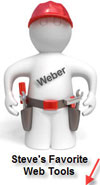Tips For On-Page Optimization
ByTen years ago SEO usually referred to “on-page” optimization. Back in those days keyword density was the hot SEO topic. My how things have changed! In the “old days” there was debate about whether a 4% or 6% density was best. Today, densities that high will raise the red flags at Google HQ! In all but the smallest of niches, “off-page” optimization is now considered of greater importance than on-page SEO.
Definitions: On-page optimization refers to how we create the actual web page. Word count, keyword density, title tag, meta description, inter-linking, bolding, heading tags, etc.
Off-page optimization refers to what we do off of the site. Obtaining backlinks on other relevant and respected sites is the most important off-page optimization method.
Is on-page optimization still important in mid to large sized niches or areas? Of course! When we build plenty of great backlinks which lead back to our well optimized, content rich web site, Google will fall in love with our web site…or at least we are providing them every opportunity!
In a way, writing content for our sites today is much easier than in times past. First, we are not constantly checking keyword densities! (unless you think you are prone to over-optimization!) Secondly, the process of LSI (if unfamiliar with that term, read my post about LSI) gives us permission to use a wide variety of words and still maintain good optimization; this makes writing so much easier!
On-page Optimization Tips:
- Optimize the file name with the keyword. Example: If the page is about leather dog collars, name the file something like “leather-dog-collar”. In other words, when you open that page, the URL would look something like this: “www.mysite.com/leather-dog-collar…”
- Forget those 6% densities! Today 1% is more like it! In fact, if you have the keyword in the title tag, in the heading of the article, in the first or second sentence, and once more, maybe twice, later in the article (assuming a 400 to 600 word length) Google will understand the subject of your page.
- Title tags: Again, make sure the title tag is well optimized when you create the web page. (By the way, the title tag is what shows at the very top of the browser window and is bold lettering in Google search results.) It’s preferred to have the keyword first in the title tag. Other words in the title tag will dilute the importance of the keyword. Be prudent when adding extra words to the title tag. If your site is large, be sure to use Webmaster Tools to make sure you do not have duplicate titles tags on the site.
- Show your keyword in the heading of the page. If possible, put that heading in h1 or h2 tags. With the heading, you can be more liberal with other words and gear it more toward the human aspect of optimization.
- Bold your keyword once in the article. There’s no need to do it on every article, but do it regularly. (We do not like to patterns of similar behavior when optimizing…it’s not “natural”)
- LSI now allows us to well optimize our content without worries about keyword stuffing. Google understands synonyms and related topics. Google actually EXPECTS similar and related words to show up on the same page in order to give them more confidence for the true topic of the page. Examples include: dog/canine, home/house/, cat/feline, car/automobile, television/TV, quick/fast, easy/simple, etc.
- Inter-link your pages together. Simply having links to your other pages in a redundant navigation system is not enough. Put a link or two on each page’s content to other relevant pages on your site…use keywords in the anchor text related to the site’s other pages of course.
- Once in a while it is fine to link off the page to a very relevant .org and .gov site. These are preferred since they rarely are your competitors and in general Google well respects those types of sites. Do not go overboard on this…here and there on a mid-sized site is fine.
- Lastly, but definitely not least, write your content with HUMANS in mind. Don’t be a slave to “writing for the search engines”. It’s easier, more fun, and Google is “smart” enough today to appreciate human oriented content. Any hints of over-optimization and Google will deal out the appropriate punishment. If you wonder if you have optimized too much, you probably have!
That’s about it. Those simple steps, along with appropriate off-page optimization, will ensure your site has the best chance in Google and the other search engines!

























Great information Steve. Being a teacher you obviously know the importance of repetition when speaking to your students. I know every single thing that you are talking about in this blog, however, I have forgotten a good percentage of it. So, I’ll go back and look my site over and make the appropriate adjustments.
Thank you so much,
Michael
Once again, I was duped into believing that this could be easy. I took your advise and got a .com, spent 24 grueling hours attempting to make any part of it work and just asked for a refund. Your emails and articles are very convincing though. Wish you well!
Thanks Michael!….great to hear from you! ….hope your new year is going great so far!
I hope you didn’t meant that I ever said it was easy. What were you trying to do do? Get your blog up or ???
Some good information. Will be using some of the seo strategies on my site. Will let you know how i get on.
if anybody tells you that making money on the internet is easy – slap them -it’s hard, hard work !
“…if anybody tells you that making money on the internet is easy – slap them -it’s hard, hard work !”
hehe….correct…nothing quick and easy about all this!
This article is helpful for me.